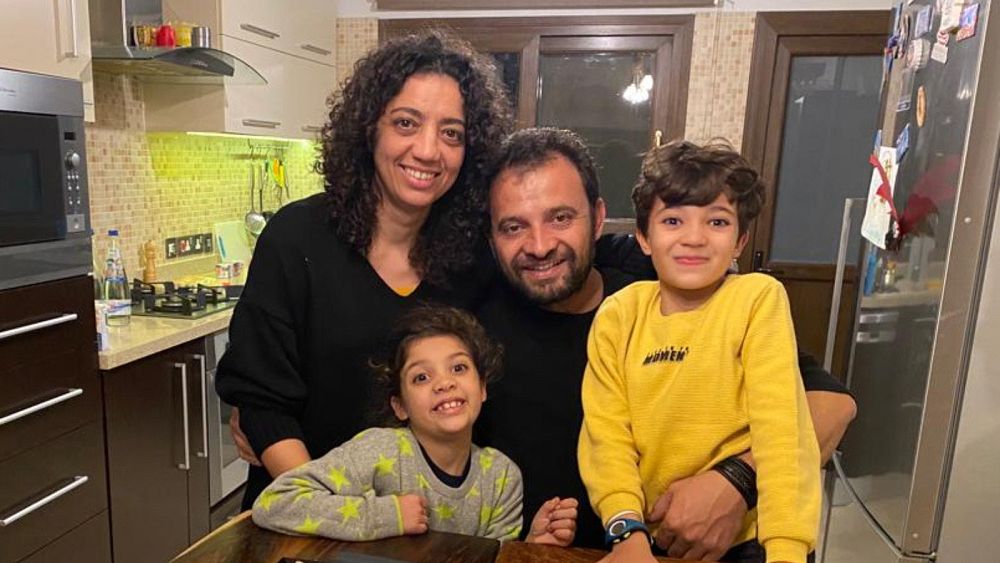
Cyprus has had a turbulent half century.
In 1974, the small Mediterranean island was divided into two halves — one Greek, one Turkish — after Turkey invaded the north. Each has its own separate political system, with different citizenship rights.
The enduring legacy of that occupation is still impacting thousands of people who live cross-border lives.
Umit, a 44-year-old electronics engineer, runs his own business in the divided Cypriot capital Nicosia, but on the Turkish-administered side of the green line.
His story began in 1975 when his father came to Northern Cyprus from Turkey and met his mother, who is a Cypriot citizen. Married for a short time, the couple parted ways when Umit was one year old. Despite being born and raised on the island and his mother being a Cypriot citizen, Umit is internationally deemed stateless.
The identity card he obtained from the Turkish Republic of Northern Cyprus (TRNC) is not recognised by any state other than Turkey.
He applied for citizenship from Cypriot authorities in 2006 but 17 years on, he still doesn’t have an official answer as to why he is unable to obtain it.
“I kept going back and forth to the ministry every 6 months to see what is happening with my application but had no answer,” he says. After concluding that he will never get a response, he brought the case to court.
The father of two is not willing to give up, especially now his citizenship problems have become a generational issue.
Umit’s two children have also not been able to get Cypriot citizenship, despite their mother being from the Republic of Cyprus.
“They may delay my application because my father is a Turkish citizen, okay, but what about my 11-year-old son and 9-year-old daughter?” Umit asks.
“Me and my partner, both of us are from the island, we were born here, both of us hold birth certificates from Cypriot authorities and plus I am not even a Turkish citizen.”

He also adds: “I did try to become a Turkish citizen after losing hope at home, I didn’t have any other choice but according to Turkish official records I don’t exist”.
Umit’s parents were married in the TRNC, but marriages from the north side of the border are not officially recognised by the Republic of Cyprus.
At the time, the newlyweds didn’t inform authorities in mainland Turkey about their wedding on the island, and according to Turkish records, Umit’s parents never tied the knot, making it even harder to prove his identity.
“Cyprus” is a delicate and complex issue with a long history of conflicts encompassing Turkey and Greece.
And this is where Umit’s statelessness has its origins.
Achilles C. Emilianides, a professor of law and dean of the School of Law of the University of Nicosia says the issue doesn’t just pertain to children of mixed marriages in general, but particularly to children of Turkish Cypriots and persons of Turkish origin.
Prof. Dr Achilles C. Emilianides
He explains that the problem derives from the complex situation often called the ‘Cyprus Problem’:
“In 1974 Turkey invaded and has since occupied the northern part of the island, and in 1983 it declared the occupied area as ‘Turkish Republic of Northern Cyprus’ an entity which is not internationally recognised (other than by Turkey)”.
The Republic of Cyprus has regularly accused Turkey of trying to change the demographic character of the occupied area through the implantation of settlers from mainland Turkey, Professor Emilianides explains.
Given this, the Republic of Cyprus argues that the possible legalisation of the Turkish settlers would not only modify the demographic structure of the island and constitute a constant source of tension, but further threaten the stability and security of the Republic, a view which has been adopted also by the Council of Europe, he adds.
According to Prof Emilianides, the government of the Republic of Cyprus does not take decisions easily, as the areas where the marriage is celebrated are not under its control and it often does not have sufficient data in order to confirm whether this is a case of illegal settlement or not.
Turkish nationals are able to visit the island through the northern borders controlled by the TRNC and the Republic of Cyprus defines anyone entering the island through these borders as “illegal”.
Does the issue contradict European values?
Activists who help those taking legal action against the Republic of Cyprus argue that every child is entitled to a nationality and the current practices are violating human rights.
The European Union considers the whole of the island as part of the EU, but activists say then why are European values not respected?
A few activists, behind an initiative called ‘Uncredentialeds’ are now collecting signatures to file an appeal to the European Parliament Committee on Petitions.

John, (not his real name) is a member of the Uncredentialeds.
“We do not want a favour from the government. We have no political affiliation nor any political interest. We just want to exercise our constitutional right, which clearly states that any child of a Cypriot citizen parent is entitled to Cypriot citizenship”, he says.
“The majority of these children who pushed to take up Turkish citizenship, have never been to Turkey nor have any connections there. They identify themselves as Cypriots, yet are not recognised officially as such,” he tells Euronews.
It is alleged that the Republic of Cyprus is either deliberately not responding to the applications, or delaying the process in order to not give citizenship to those who have Turkish roots, even if the applicant’s Turkish roots go back two generations.
Activists claim they have also seen a number of cases where people living in Turkey, but never stepped foot inside the island, easily obtain Cypriot citizenship in order to become EU nationals, due to their ancestral links with Cyprus.
This, they say, is a double standard.
Euronews approached the Cyprus Interior Ministry for comment and requested the official number of applications for citizenship that are yet to be processed, from 2003 until now, by the children of mixed marriages, but has not yet received any reply.

Many lawsuits have been filed by people who have not received a response to their citizenship application.
Claimants argue that reaching the documents in the application dossier or getting an update from the officials is impossible. Some even say that they have not been given a reference number.
John claims the courts are also deliberately not concluding the cases in order to prevent them from taking further actions.
“To apply to European Courts of Human Rights, exhaustion of domestic remedies is required, when we don’t get an answer internally, we can’t take the cases elsewhere,” he says.
John and his friends in Uncredentialeds will continue their campaign throughout March and are planning to file their petition at the end of the month.
According to unofficial numbers around 30 thousand people have been directly or indirectly affected by the delays in finalising citizenship applications. John believes people are hesitant to give their signatures because of the fear of reactions from either the Republic of Cyprus, or the TRNC.
He says, “people born into mixed marriages didn’t choose their parents, they are not guilty of anything but their fundamental human right to a nationality is violated”. Love knows no identity is their slogan.
Some born into these marriages are now adults in their 30s and 40s and only have two options for obtaining an internationally recognised passport: either from Turkey or the RoC.
Huri Yontucu
Huri is a 33-year-old academic at the East Mediterranean University.
She tells her story: “My dream was to study in the UK, but I was unable to get a quick response from the authorities regarding my citizenship application I made in Cyprus around 17 years ago. When I got accepted to the university in the UK, I was left with a single option which was to get a Turkish passport to study there. The agency dealing with my paperwork had complications with my student visa application and was I barred from re-applying for a UK visa for 10 years”.
Huri continues. “I was born in Cyprus, raised in Cyprus, my mother is Cypriot and my father lived here for nearly 50 years, I don’t know what else I need to prove my Cypriot identity. I have no connections in Turkey, I am not from Turkey, having a father born in Turkey does not automatically mean I am from Turkey, yet I was forced to take up Turkish citizenship because I had no other choice”.
She would have fulfilled her childhood dream if only she had been able to get Cypriot citizenship which would have also made her an EU national and free to travel and study in the UK at the time (pre-Brexit).
Any prospect for a solution?
Professor Emilianides highlights that “there has been in recent months a wider public debate on how the issue can be solved, without undermining the international position of the Republic of Cyprus and/or without this being interpreted as the legalisation of settlement”.
A parliamentary question was put forward by a member of the European Parliament Niyazi Kızılyürek in October 2022 regarding the difficulties faced by stateless Cypriots and the Commission said in its response, “According to the established law of the Court of Justice of the European Union, each member state determines the necessary conditions for the attainment and loss of its citizenship within the framework of international law. However, in cases covered by EU law, member states’ rules on nationality must also comply with EU law”.
Many Turkish Cypriots, like Canan, a 65-year-old British Cypriot, believe ordinary people bear the brunt of political tensions.
The community in the north has witnessed a rise in population in recent years with many people migrating to the island from Turkey. Some locals worry this may undermine future peace negotiations that are already stalled.

“The root of the problem is Turkey and Greece and their desire to keep the conflict alive for their political gains.” she says.
“Cypriots on the south side are not happy with Greece and the community in the north are not happy with Turkey, if only they let us alone, we as two communities will live happily ever after as one country. My generation has seen the bloody times, I understand why they can’t find closure because they have lost their loved ones but at the same time, we witnessed how people in the south have protected their Turkish neighbours and northern protected their southern friends”.
“The new generation has left the past behind and wants to get on with their lives,” she adds.
Surveys show that the majority of both communities want a solution to the long-lasting dispute. According to a 2019 report by the World Bank Group, “The bi-zonal, bicommunal federation model is the most acceptable model in the north and second most acceptable among Greek Cypriot community”.
Other research conducted in 2020 by academics revealed that a wish for a federal Cyprus has been registered by a clear majority of 66.5% among Greek Cypriots and 63.6% among Turkish Cypriots.



